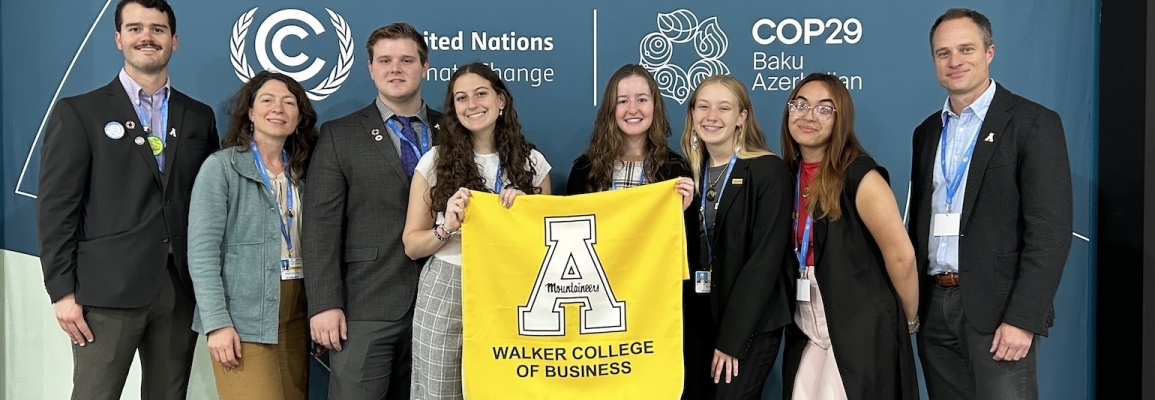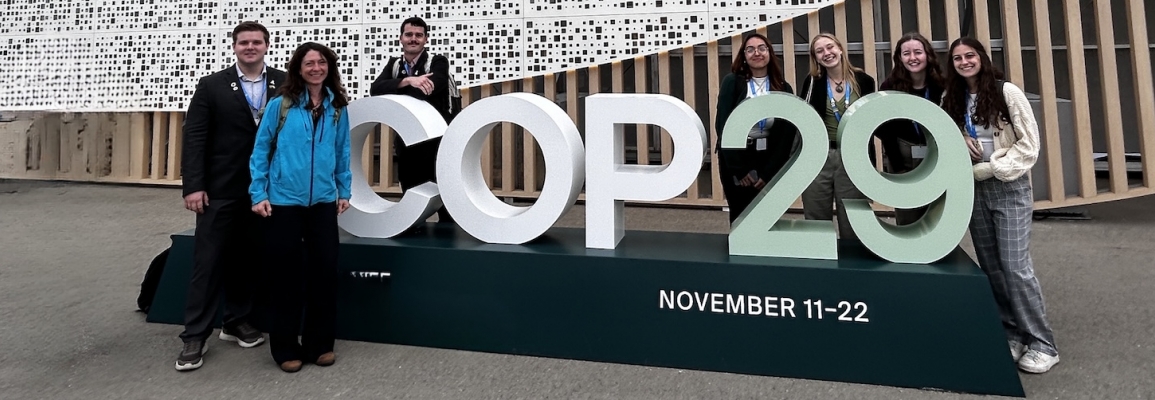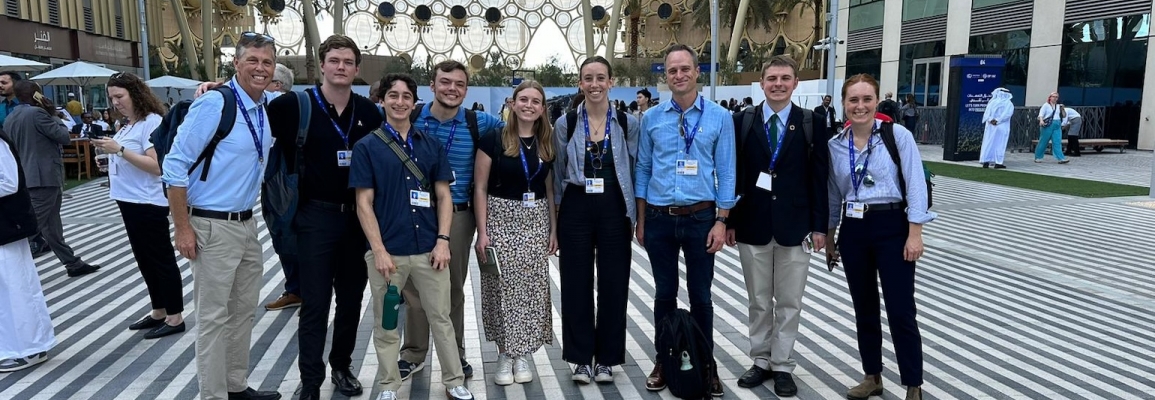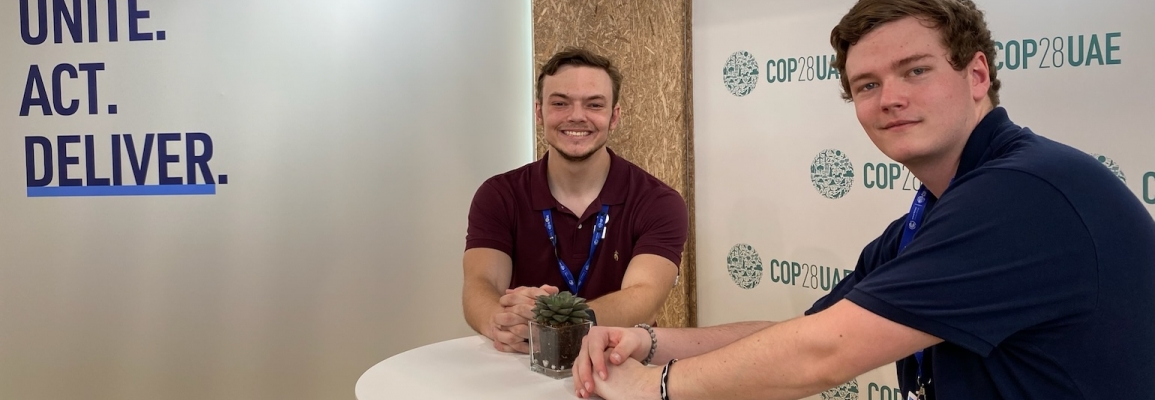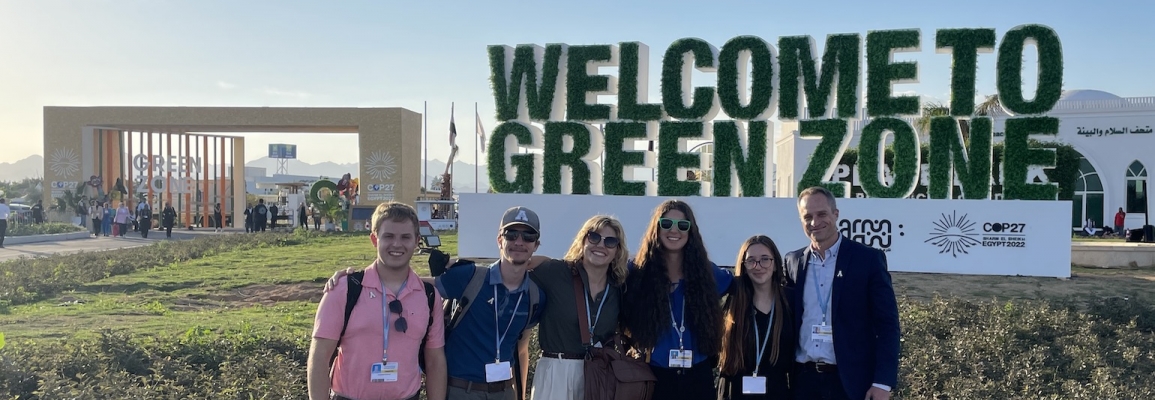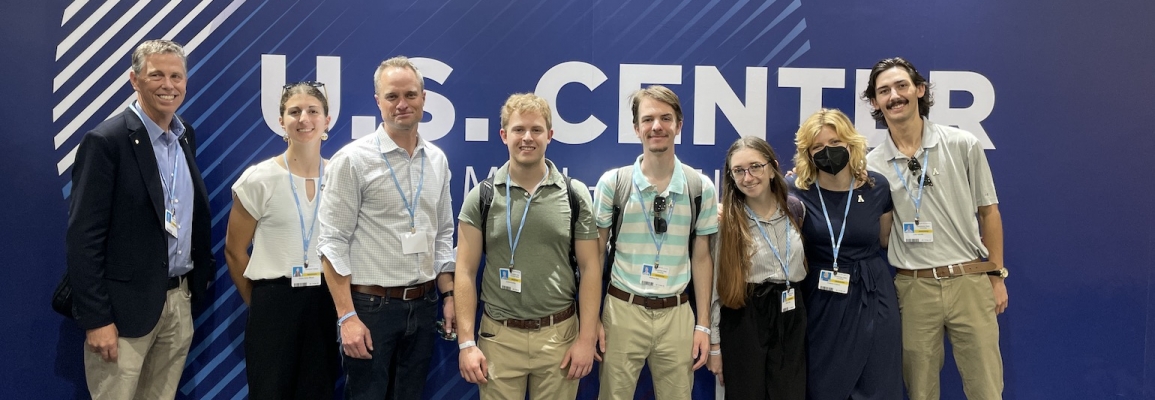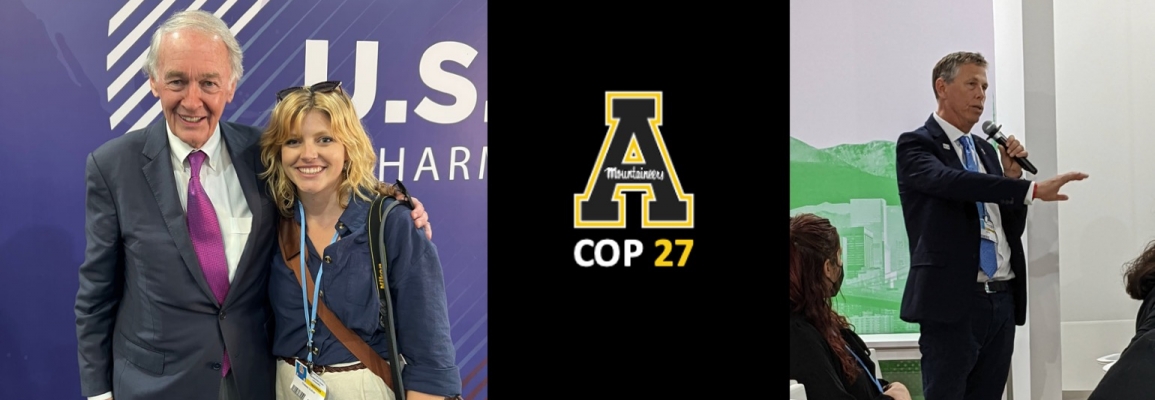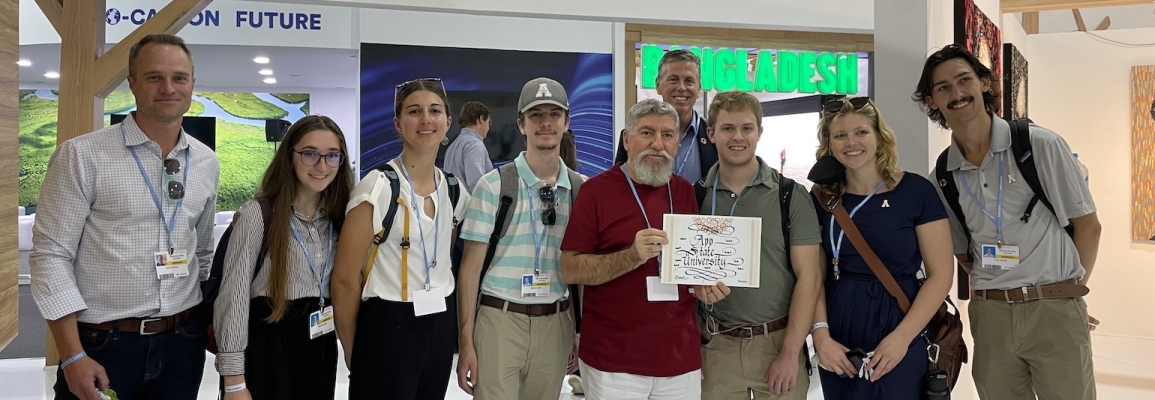Engaging Students in Climate Diplomacy
Students are selected into the UN Climate Negotiations course (ECO 4530/5530) and program through a competitive application process. The program is offered through the Walker College of Business and welcomes students from all disciplines. The course familiarizes students with the United Nations Framework Convention on Climate Change (UNFCCC) and the annual Conference of the Parties (COP). Each fall, a delegation of students and faculty from App State travel to the COP and participate in the negotiations.
COP 30 Delegation
An App State's delegation will travel to Belém, Brazil, to participate in the United Nations Climate Change Conference and the 30th Annual Conference of the Parties (COP30).

“International collaboration on climate policy and governance is more critical than ever. As COP30 convenes this year, I’m particularly interested in how it addresses the challenges of climate inequality. Achieving true climate justice requires systemic global commitment across political and economic institutions to ensure equitable access to resources.”

“Climate change governance must include accountability, especially for countries and corporations that have profited most while contributing heavily to environmental harm. I am interested in how COP navigates the tension between powerful nations and the communities most affected by climate change. With so many global perspectives represented, I want to observe how principles like justice, transparency, and inclusion are reflected in international negotiations. Understanding how decisions are made and whose voices are prioritized will offer important insight into the path toward fair and effective climate solutions.”

Our planet’s climate crisis poses threats to all of us, making it necessary for international collaboration to take place. As extreme weather events become more severe and more frequent, climate policy comes to the forefront of international politics. With periphery nations facing the brunt of these catastrophes, we must foster communication between world leaders that addresses not only the disproportionate effects of the climate crisis but also the root causes of said crisis. At COP 30 I am interested in seeing how environmental injustice and marginalized populations are addressed and how accountability might be taken by the Global North. All stakeholders in the climate crisis hold different positions of interest in the matter, making this acknowledgement essential in creating equitable solutions.

“The diverse knowledge and perspectives put forth each year at COP conferences offer a glimpse into an incredibly complex and convoluted story that with each new chapter reveals new intricacies in regards to global climate policies. It is in my interests to better understand these entanglements to further my understanding of international climate related discussion in order to explore future avenues of solutions and scale.”
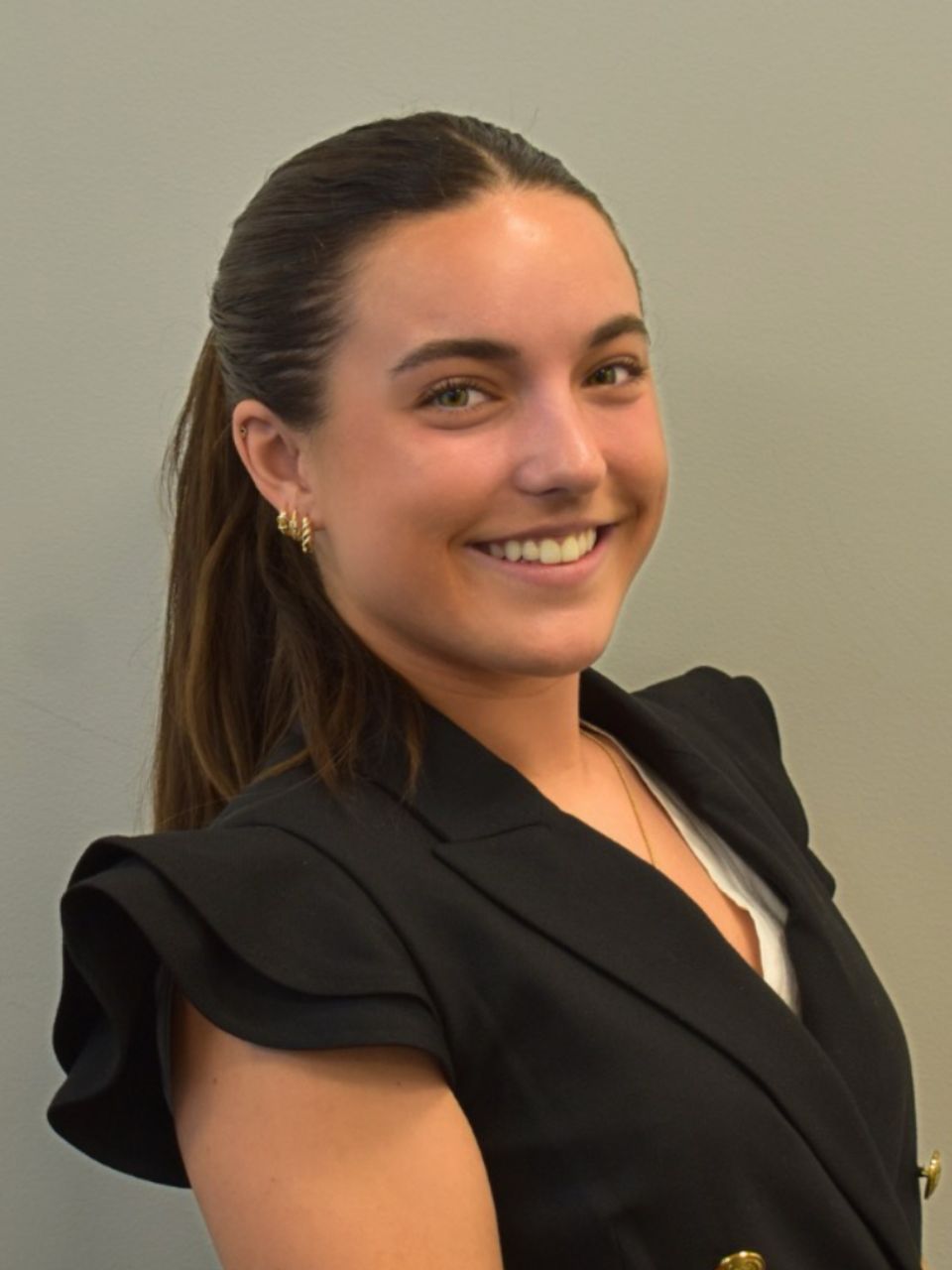
“Problems that affect the global landscape require worldwide collaboration. I am deeply committed to discovering the potential solutions that can be developed through knowledge sharing and collaboration. This year, I am interested to see how COP30 can accelerate the global transition towards more responsible practices and innovation.”

“As countries continue to advance their climate pledges at COP 30, collaboration between governments and businesses will become increasingly vital towards aligning policy with global climate investments. Understanding the investment priorities of various stakeholders will provide a strong look into the resources needed to meet critical climate goals laid out in the Paris Agreement. I am interested in how international negotiations contribute to the development of innovative, sustainable energy solutions—particularly those tied to global energy efficiency commitments.”
Faculty

Meredith Pipes
Global and Civic Engagement Specialist
Meredith Pipes is the Global and Civic Engagement Specialist for the Walker College of Business. In this role, she promotes international opportunities, supports diversity initiatives and serves as a sustainability champion for the college. Her experiences abroad have profoundly shaped her understanding of the world and she loves seeing students broaden their perspectives through interactions with new ideas, new places and people different from themselves. Meredith earned a Master's degree in Latin America Studies from the University of Kansas.

Dr. Dave McEvoy
Professor and Chair, Economics
Dr. McEvoy serves at the Organization Head for App State's involvement in the United Nations Framework Convention on Climate Change. His research is focused on the design and effectiveness of international environmental agreements. Dr. McEvoy has graduate degrees in environmental economics from the University of Massachusetts-Amherst and the University College London.
Past Delegations
Get Involved
Email mcevoydm@appstate.edu.
In the Press
An Appalachian State University delegation of students and campus leaders returned from the recent United Nations climate change conference in Egypt with a shared sense of hope and purpose, an eye-opening firsthand look at international policymaking — and a job offer.
The trip to Sharm el-Sheikh, Egypt, to attend the 27th Annual Conference of Parties (COP27) in November marked the second consecutive year that App State was represented at the event, which is held by the United Nations Framework Convention on Climate Change. The 12-day conference drew over 40,000 delegates representing 198 countries engaged in the global response to climate change.
- App State students join global climate action at COP 29 - Dec. 6, 2024
- COP 28 App State delegates Mia Altieri and Grace Gliwa speak at the 2024 Energy Summit - May 30, 2024
- Podcast episode: AppState at the United Nations Climate Conference - April 28, 2023
- Honors College Students Travel to Egypt - Honors College Appstate - Nov. 30, 2022
- Three App State leaders attend climate summit in Scotland - Watauga Democrat - Nov. 11, 2021
- AppState leaders reflect on COP 26 conference - Watauga Democrat - Nov. 30, 2021
